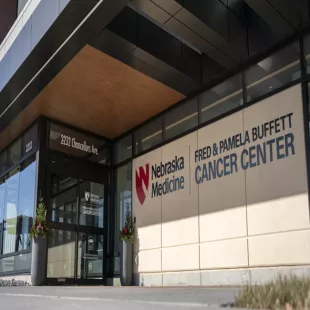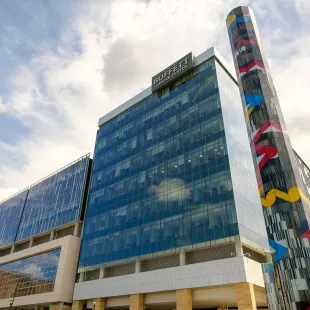Compared to other cancers, testicular cancer is not very common.
However, testicular cancer is the most common cancer in young men between ages 15 and 39 and has a cure rate of 90 percent when prompt treatment is received. Nebraska Medicine has the expertise and experience to diagnose and treat these cancers with the most advanced diagnostic and treatment options.
Why Have Your Testicular Cancer Treated at Nebraska Medicine?
Expert Radiologists Providing Second Opinions
As part of the evaluation, all outside films and scans are re-reviewed by a specialized radiologist with expertise in prostate and testicular cancers.
Access to the Latest Techniques and Tools
Doctors at Nebraska Medicine incorporate the latest techniques and research on testicular cancer, thanks in part to Nebraska Medicine's academic partner, the University of Nebraska Medical Center.
One of these treatment tools is the Varian TrueBeam STx radiosurgery system, one of the most advanced forms of radiosurgery technology. This therapy is specifically designed to deliver radiation very quickly and in fewer treatments with greater precision than ever before. Ongoing studies are showing that higher doses per treatment delivered over fewer treatments may be more effective, especially in areas such as the prostate and lung cancer.
Dedication to screening
The PSA prostate screening is the most important tool to reduce mortality due to prostate cancer. The screening is responsible for a significant decrease in the death rate due to prostate cancer over the last 25 year or more.
All men ages 50 and older with a life expectancy of at least 10 years should discuss with their physician the benefits of getting a PSA screening to determine if screening is in their best interest. High risk individuals, which include African American males and those men with a first-degree relative who has been diagnosed with prostate cancer at 65 or younger, be screened starting at age 45.
Clinical trials
Many of our specialists are very involved in research to find new treatments and cures for urological cancers. This affords our doctors the opportunity to take part in some of the most current clinical trials, giving you early access to the newest drugs and most cutting-edge treatment options before they become widely available. See what testicular cancer trials are currently underway.
Addressing Your Personal Care Needs
Addressing a patient’s physical, educational, emotional and spiritual needs are important aspects of providing a more complete and holistic approach to care. A host of amenities and supportive services are available to help meet these needs. This includes personal care services such as wigs, wig fittings, yoga, massage therapy, skin care and more specifically geared for people with or recovering from cancer are also provided in a private setting.
Cancer Support Services
Finding out that you have cancer can be a very emotional and difficult time. You will likely have many questions and issues to work through. We will be with you every step of the way. Nebraska Medicine offers a host of cancer support services to help you with your physical, emotional, educational and financial needs.
We're Here for you Long After Your Treatment
Our Survivorship Clinic is designed to help you deal with the emotional and physical challenges cancer can leave behind such as fear of recurrence, physical and medical long-term side effects and helping you return to a normal life again. It will also help you transition back into the care of your primary care physician.
Our Locations
-

-

Fred & Pamela Buffett Cancer Center - Nebraska Medical Center
505 S 45th St.
Get Directions
Omaha NE 68105
-
Cancer support services
From support groups to wellness centers to help you with the physical and emotional changes you're experiencing, see a list of all our supportive services for cancer patients.
View More